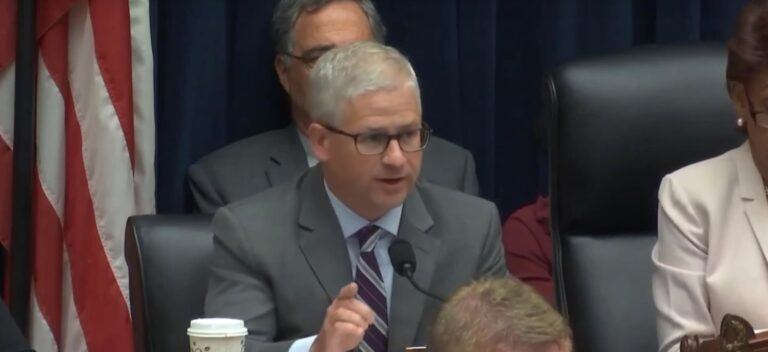As far as cryptocurrency fans are concerned, one U.S. Congressman, Patrick McHenry, was the star of the House Financial Services Committee hearing on Libra on Wednesday (July 17).
Before we talk about what happened at this hearing, and more specifically, how Congressman McHenry managed to endear himself to all blockchain and cryptocurrency fans, it might be helpful to present a very brief biography of him here.
Patrick Timothy McHenry is the U.S. Representative for North Carolina’s 10th congressional district. He is serving his eight term at the U.S. congress, where he is currently the Republican Leader of the House Financial Services Committee, “a committee he has served on since he was elected to Congress” (in 2004, when he was just 29 years old).
On Wednesday (July 17), a day after Facebook’s David Marcus, who is a co-creator of Libra and the head of the Calibra project, faced tough questions at the U.S. Senate Committee on Banking, Housing, and Urban Affairs (aka “Senate Banking Committee”), came the real grilling at a full hearing (titled “Examining Facebook’s Proposed Cryptocurrency and Its Impact on Consumers, Investors, and the American Financial System”) of the U.S. House Committee on Financial Services.
Committee Chairwoman Maxine Waters (D-CA), who had previously implored Facebook to stop working on the Libra project until Congress could understand better the implications of what Facebook’s proposed cryptocurrency, started the hearing by delivering a prepared statement, during which she, once again, expressed her “serious concerns with Facebook’s plans”:
This venture is slated to be based in Switzerland, which has a history as a monetary haven for criminals and shady corporations. Facebook’s plans raise serious privacy, trading, national security, and monetary policy concerns, not only for Facebook’s over 2 billion users, who will have immediate access to these products, but also for consumers, investors and the global economy.
Congressman McHenry’s gave his opening remarks around 11:00 (Eastern Time). Here were the main highlights:
- “Washington must go beyond the hype and ensure that it’s not the place where innovation goes to die.”
- “Just because we may not fully understand a new technology proposal does not mean we should immediately call for its prohibition, especially when that proposal is just that — a proposal.”
- “The reality is whether Facebook is involved or not, change is here. Digital currencies exist. Blockchain technology is real. And Facebook’s entry in this world is just confirmation, albeit at scale.”
- “The world that Satoshi Nakamoto, author of the Bitcoin whitepaper, envisioned—and others are building—is an unstoppable force.”
- “We should not attempt to deter this innovation, and governments cannot stop this innovation. And those that have tried have already failed.”
- “Instead of a knee jerk reaction of banning something before it begins, my Replication colleagues and I want to first try an understanding. An in turn, based off what we learn, determine whether or not our current regulatory framework meets the demands of this new technology.”
Then, around 15:30 (ET), McHenry began his questioning of David Marcus about Libra; some of his most interesting questions are listed below.
McHenry: Is it a security?
Marcus: We don’t believe it is, Congressman.
McHenry: Is it a commodity?
Marcus: Congressman, based on current U.S. law, it might be a commodity, but we see it as a payment tool.
McHenry: Is it an exchange traded fund?
Marcus: It is not, Congressman.
Congressman McHenry repeated his claim about Bitcoin being an unstoppable force during an interview with Andrew Ross Sorkin on CNBC’s morning news and talk program “Squawk Box”:
I think there is no capacity to kill Bitcoin. Even the Chinese with their firewall and their extreme intervention in their society could not kill Bitcoin.
Sorkin then told McHenry that although it might not be possible to technically “kill” Bitcoin, it was possible for governments to create legislation that made access to Bitcoin illegal for their citizens at fiat on/off ramps such as exchanges (e.g. Coinbase) and custodial wallets (e.g. Calibra), and that would “effectively make it very very difficult for the mainstream to use it.” Sorkin then said that’s why investors in Bitcoin were worried, which explained the recent drop in price.
McHenry replied:
Yes, so the price has come down to roughly $10,000… But you are talking about something that… people were giving away for free. It's now trading at $10,000… But the essence of Bitcoin is what Libra, Facebook, and corporates are trying to mimic.








